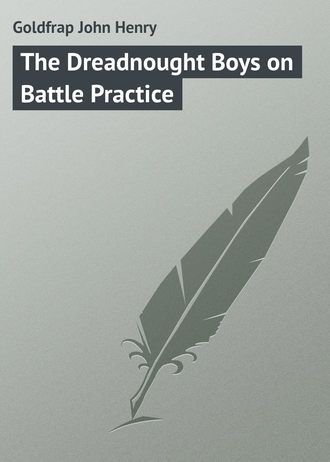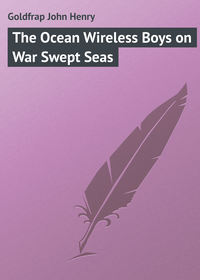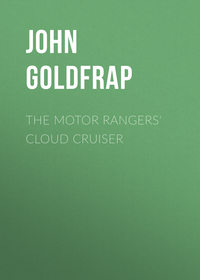 полная версия
полная версияThe Dreadnought Boys on Battle Practice
The captain's "court" convened just forward of the stern awnings, and a little abaft the towering "cage" aftermast.
The "old man," in full uniform, with a sword at his side, Lieutenant-Commander Scott, and several of the officers stood in a little group chatting, as the prisoners were brought aft. All wore side arms and what the Jackie calls "quarter-deck faces" – meaning that they looked as stern and uncompromising as flint.
"I guess I'll get life," muttered Herc to himself, as he heard the stern doom, of stoppage of five days' pay and ten days in the brig, without future shore leave, pronounced on three sailors who had been found guilty of coming on duty in an intoxicated condition, at New York.
"You men are to understand that the United States navy has no place for men who wilfully indulge in such practices," the captain had said, with blighting emphasis, as the men trembled before him. "Clean men, clean-living men is the material the government wants, and such as you are better out of the service. The navy is better off without you if you go on as you have been doing."
Herc felt his cheeks blanch as pale as had the countenances of the guilty ones as he heard this stern speech.
Next came the turns of the two men who had shared the same cell with him.
"Carl Schultz, ordinary seaman, and Silas Wagg, ordinary seaman," read the captain's yeoman who acted as a sort of "clerk of the court."
"What's the offense?" asked the captain.
"Overstaying their shore leave four hours, sir," was the rejoinder.
"Any previous bad record?"
"No, sir. I have found none," volunteered the master-at-arms.
"Men," said the captain, in the same icy tones as he had used toward the three intemperate prisoners, "you are guilty of a serious offense. In the navy regularity should be a watchword with all of us. It may seem to you that to overstay your leave by four hours was but a small matter, and that you yourselves would not be missed among eight hundred or more men. Yet every one of the crew and each of your forty-two officers has a niche of his own to fill. We are all cogs in the same great machine, servants working for the good of the same government.
"If any one of us is derelict in his duty, he is not only derelict to himself and to his officers, but to his country and his flag. Always bear that in mind. As this is your first offense, and your officers tell me you are hard-working men and good seamen, I shall dismiss you with a reprimand. But mind," he added sternly, "if either of you is brought before me again I shall not prove so lenient. Carry on."
With grateful faces, the two men hastened off forward.
How Herc longed to tell of what he had heard in the cell! But he dreaded to make himself appear ridiculous by reciting what might seem an improbable story, cooked up by one who already rested under a cloud, so he said nothing.
In fact, he was not allowed long to entertain these thoughts, for hardly had the two worthies who had shared his cell made the best of their way forward, before the yeoman, in a voice that affected Herc much as a sudden plunge into ice water would have done, shouted out:
"Ordinary Seaman Taylor!"
The story of Herc's knocking out the bully had already spread through the ship – a place where gossip travels as swiftly as through a small village – and the officers and the few men whose duties brought them near to the "court room" – eyed Herc curiously as he stepped forward, with head bared, holding himself as erect as possible. He saluted as he clicked his heels together with painstaking precision. His heart beat fast and thick, however, and there was an anxious look in his eyes as he faced his inquisitors.
Herc was a brave boy, full of pluck and grit; but the ordeal before him might have caused a stouter heart than his to quail.
"Master-at-arms, what do you know about this case?" asked the captain, as Herc stood rigid, twisting his cap in his big hands.
The master-at-arms rapidly rehearsed what he knew of the affair, and then the captain turned to his executive officer.
"Mr. Scott, there is a complainant in this case, is there not?"
"Yes, sir," was the reply. "Mr. Andrews, who had the deck this morning, so reported to me."
"Able Seaman and Gunner Ralph Kennell is the man, sir," said Lieutenant Andrews, stepping forward.
"Very good. Where is this man Kennell?"
"Here, sir," said Kennell, stepping forward in his turn.
His face shone with soap, which yet had not been able wholly to eradicate the traces of slate-colored paint with which he had been shower-bathed. Over his left eye a big bit of plaster showed where "Pills" had patched him up. Beneath the same eye a dark bruise was beginning to spread. His jaw was also woefully swollen where Herc had landed his effective blow.
"Now, Kennell," began the captain, who was perfectly aware of the bully's record, and marvelled as much as his officers how such a slim lad as Herc could have inflicted such injuries on him; "now, Kennell, tell us in as few words as you can what occurred this morning between you and Ordinary Seaman Taylor."
"Well, sir," began Kennell sullenly, "I was making my way aft to clean brasswork, sir, when this man here, sir, drops a pot of paint on my head, sir, out of pure malice, as I believe, sir."
"Never mind what you believe. What happened then?"
"Then, when I protested, sir," went on Kennell, "he climbs down from the turret he was a-painting, sir, and strikes me."
"Where?"
"Right by the forward twelve-inch turret, sir."
"You mean your eye, don't you?"
"Well, sir, he struck me all over, sir," complained Kennell.
"And you had done nothing to him?"
"Nothing, sir."
"Very good. You may stand aside. Taylor, what have you to say to this story?"
"Not much, sir, except that it is a fabrication," said Herc indignantly, his fear at the officers swallowed in his wrath at Kennell's lying tale. "It is true I dropped the paint on his head. That was accidental, however. So far as his injuries go, I believe that he got the cut over his eye when he fell against the turret. He hit it an awful whack, sir." Herc grinned broadly at the recollection.
"No levity, please. You are to understand this is a serious matter. Who struck the first blow?"
Herc hesitated. It was no part of his ideas of what was right to tell tales on a fellow seaman, and yet Kennell had lied cruelly about him. Suddenly his mind was made up.
"I had rather not say, sir," he said at length in a low tone.
"What! Are you aware that this is a confession of guilt, or equivalent to it?"
"Perhaps so, sir, but I cannot say," repeated Herc stubbornly.
"Very well, then," said the captain in his most dignified tones, "I shall have to inflict a heavier punishment on you than I would otherwise. You are one of the two recruits whose gallant conduct on the Rhode Island caught my favorable attention. I am therefore doubly reluctant to punish you. But the discipline of the service must be upheld. Seemingly, you are screening some one. You must learn that your officers are to be obeyed, and also the regulations. No regulation is more mandatory than that forbidding fighting and unseemly conduct on the ships of the United States Navy. I shall therefore sentence you to two days in the brig with prison rations. Master-at-arms!"
"Sir!"
"Carry on!"
The officer saluted, and a few minutes later poor Herc was once more in his steel cell. This time he occupied it alone, however.
"Well, two days is not such a very long time," mused Herc philosophically; "and I expected at least two months, by the way that captain talked to me. I'm in here now, but let that old 'dog Kennel' look out for me when I'm foot loose again!"
CHAPTER XV.
ORDERED AFT
"Mr. Scott," said Captain Dunham, turning to his lieutenant-commander, "ask Mr. Andrews to step here a minute, will you?"
"Yes, sir," responded Mr. Scott, and a minute later Lieutenant Andrews respectfully saluted Commander Dunham.
"Andrews, I'm not altogether comfortable about giving that lad two days in the brig. The fellow Kennell I have heard is a most unconscionable bully, and, moreover, I am favorably inclined to both those lads. I saw their mettle well tested on the Rhode Island, as I told you gentlemen the other day. Have you heard any details of the matter which you could not relate officially at the inquiry?"
"Yes sir, I have," said Mr. Andrews straightforwardly. "I learned a short time ago, from a boatswain's mate who arrived on the scene shortly after Kennell had been knocked out, that young Taylor, instead of being the aggressor, had, as a matter of fact, been attacked by Kennell a few minutes after he had extended his hand and offered an apology for an unavoidable, if annoying, accident."
"Hum, hum!" mused the captain; "then it seems that there has been a miscarriage of justice here. But why, in the name of the old Harry, couldn't the young fellow have acquainted me with the full details of the case."
"I suppose, sir, that he was unwilling to inform on his shipmate. You know that 'snitchers,' as they call them forward, are not encouraged in the navy."
"No, Andrews, no. But I hate to think I have done the lad an injustice – even if unwittingly."
"I should not worry about it, sir," put in Andrews. "It will not hurt the youngster to get a sharp lesson in naval discipline which he won't forget in a hurry."
"Perhaps you are right," mused the captain; "but I should be unwilling to spoil what I am sure is a fine disposition by over-harshness. As for that man Kennell, I have been his commander on another ship of the fleet, the old Massachusetts. I am sure he is a trouble maker, and I am going to have a sharp eye kept on him. If I can detect him attempting to stir up trouble among the men, I shall visit my wrath on him pretty sharply."
"And rightly, too, sir," agreed Andrews. "So you have decided to let young Taylor serve out his sentence?"
"I think so, yes – for one day, anyway," rejoined the commander. "As you say, it will be a good lesson, though a sharp one. I intend, however, to put both those lads on a good detail as soon as Taylor is released. It will be by way of compensation for what I feel is a partial injustice."
Thus it will be seen that, while naval officers outwardly have often to "ship a quarter-deck face" and deal out what may seem harsh measures, yet they are, with few exceptions, kindly, humane men, with an adoration for their flag and country that amounts to fanaticism, and, moreover, a kindly feeling toward the men serving under them. It is somewhat hard, though, to administer the exact measure of justice among eight or nine hundred high-spirited, healthy young animals like the average American tar.
"Well, lad, the smoke lamp is lighted. Light up and forget your troubles."
Old Tom paused as he passed Ned during the rest hour, after the jackies' noonday dinner.
"Thanks. I never smoke," responded the boy, whose troubled face showed that he was still worrying over Herc's disgrace. In fact, Ned took his companion's position to heart much more keenly than did Herc himself, who, knowing in his own heart that he was not to blame, set to work to make the best of it.
It was the day following Herc's imprisonment, and already the squadron had passed into the Gulf Stream, and the warm air of the tropics was about the mighty fighting ships.
That morning the flagship had signalled to the squadron that white uniforms were in order, and very trim and neat the jackies looked in their snowy garments, as they lounged about the decks. Some were smoking and chatting, some writing letters, and others playing checkers, chess or cards, or absorbed in some book in a quiet nook.
As Ned, who was leaning over the rail, gazed downward at the foam flying past the vessel's side, he found never-failing amusement in watching the great flocks of flying fish that fled shimmering from the yellow patches of "gulf weed" as the Manhattan's mighty bow nosed into them.
"For all the world like a covey of partridges scared up in the woods at home," thought Ned to himself.
"Ordinary Seaman Strong?" asked a sudden voice behind him.
Ned turned swiftly, and saw the captain's orderly facing him.
"Yes, I'm Strong," he said.
"Come with me," directed the orderly.
Ned had been long enough on a battleship now to obey without hesitation or question when an order was addressed to him.
The lounging jackies regarded him with some interest as he passed among them.
"The pal of the red-headed lad is going to get a wigging now."
"Two of them upon the carpet in two days. They won't last long in the service."
These are samples of the comments that were bandied about as the boy passed along behind the orderly, somewhat troubled, in fact, in his own mind as to what could be the reason of the sudden summons to the captain's cabin.
Old Tom spoke up indignantly as he heard the remarks:
"A whole lot of you young varmints will still be scrubbing decks, and cleaning brasswork, and doing your regular trick in the brig after shore leave, when them two young fellows is wearing chevrons!" he snapped.
The old salt was a privileged character, and did and said pretty much as he liked among the men; but his remark aroused some resentment among those about him.
"How about you, old Growler?" asked a gruff voice. "How is it you never rose from the scrub stations?"
"'Cos I was a fool like you when I was young," snarled old Tom, as the sailors exploded in a shout of laughter at the discomfiture of the venturesome spirit that had essayed to "bait" old Tom.
"Better leave Tom alone, Ralph," shouted one of the card players; "he's too sharp for you."
"Yes, he presumes on his gray hairs to do as he likes," snarled the other, who was none other than Kennell. "It's a good thing for him he's got a bald head."
"Well, I don't need a pot of paint to cover it, anyhow!" laughed old Tom, at which there was another tornado of laughter; and Kennell, with a black look on his face, rose to his feet and made his way to another spot, one where he was less likely to encounter such a sharp tongue as old Tom's.
"Confounded old fool!" he muttered to himself as he went, "I'd like to finish up him and those two kids at one stroke! I'll do it, too, if I get a chance."
In the meantime Ned, at the orderly's heels, had traversed several of the memorable narrow, steel-lined corridors, and at last found himself in front of heavy green plush portieres, beyond which lay, as he guessed, that hallowed spot, the captain's cabin.
The orderly knocked softly at the polished mahogany door frame.
"Ord'ly, sir," he announced.
And a minute later:
"Ordinary Seaman Strong, sir."
"Send him in," came the pleasant, mellow voice of the captain.
Ned subdued an inclination to take to his heels, and entered, looking as calm as he could.
"A moment, Strong," said the captain in a pleasant voice. "I'll be through here in a minute."
Ned stood stiffly at attention and gazed about him out of the corners of his eyes while his commander wrote busily, dipping his pen from time to time in a massive silver ink-stand. The commander's quarters, although on a fighting ship, were as luxuriously appointed as the library in any mansion ashore. The fittings were all dark mahogany, relieved, here and there, with maple-wood, on which the soft lights glowed and shone. As in the officers' cabins, there was no porthole, the armor at this part of the ship precluding any such device. Thick glass, let into the quarter deck above, however, admitted light.
"Ord'ly!"
"Sir!"
The orderly sprang into view, like a familiar spirit, from behind the curtain where he had been standing at attention.
"Take these general orders to Mr. Scott!"
"Yes, sir!"
The galvanic orderly saluted and was off like a shot.
"I wonder if that fellow is equipped with springs?" mused Ned, "or if he is galvanized daily, or merely wound up by clockwork?"
"Well, Strong."
The captain was gazing at the boy quizzically.
Ned saluted stiffly, and stood straighter than ever at attention, waiting for what was to come.
CHAPTER XVI.
A BIT OF PROMOTION
"Strong," began the captain, "I sent for you to ask you a few questions. As you know, I have taken some interest in you since I witnessed your courageous behavior aboard the Rhode Island."
Ned blushed hotly, but said nothing. The captain's remark did not seem to call for a reply.
"You have ambitions, and your friend Taylor has also, I presume."
"Yes, sir," replied Ned; "we wish to advance ourselves in our chosen profession, sir."
"I am going to give you a chance," was the rejoinder. "You are, of course, acquainted with the rudiments of gunnery?"
"Yes, sir. We were schooled in the elements of gun practice at Newport."
"So I perceived by a perusal of your papers."
This was news to Ned, who had not hitherto dreamed that the commander of a vessel like the Manhattan would have time to pay any attention to two mere ordinary seamen. In this, however, he was mistaken. The officers of the United States Navy are ever on the lookout for new material, and watch any promising youngsters with keen interest, giving them every opportunity to show what they can do.
"I am going to put you and your friend Taylor on a gun crew."
"Oh, thank you, sir!" burst out Ned, his eyes almost popping out of his head, but preserving a cool exterior, nevertheless.
"Wait a minute. I have not finished yet," went on the captain, with a twinkle in his eye. "Your friend Taylor is er-er somewhat impulsive, I should imagine?"
"Well, yes, sir; but he had plenty of provocation for what he did the other day," spoke up Ned boldly. He was delighted that a chance had come to tell the facts in the case which poor Herc, in his embarrassment, had neglected doing.
"So I understood. The man Kennell, I understand, attacked him. For this reason Taylor will be released to-day. But even so, he had his recourse in reporting the matter."
"That was not all, sir," broke out Ned.
"Not all? What do you mean?"
"That I saw the man Kennell deliberately trip Herc – Seaman Taylor, I mean, sir – as he was walking the boom the day he boarded the Manhattan."
"You mean the day you dived over after him? It was pluckily done."
"Yes, sir. Kennell had been badgering him in the boat, and then deliberately tripped him."
"That chimes in with the reports I have heard about Kennell," remarked the captain. "However, that matter is past, and official action cannot now be taken. I have spoken to the gunnery officer, Lieutenant Timmons, about you two boys, and to-morrow you will be a part of the crew of the fifteen-inch guns in the forward turret."
Ned's heart was too full for utterance. He stammered his thanks, and obeying the captain's curt nod of dismissal, hastened from the cabin, his head fairly buzzing over the good luck that had come to them.
"If I am not mistaken," thought the captain, as Ned left the cabin, "I have selected two good bits of material in those lads for Timmons. Yet the experiments with that Varian gun are going to be dangerous, and perhaps I was wrong to place those two boys in peril. However, the life of a sailor is made up of risk and danger, and there is no more danger with that gun than with any other piece of modern ordnance. It is only because it is untried that it seems more fraught with possible mishap."
Had the captain possessed the gift of prophecy – But what man or woman does? If they did, perhaps many of the experiments which have proved of the biggest ultimate benefit to the world would never have been tried.
Ned, his head fairly buzzing with his good fortune, hastened forward. He wished he could communicate with Herc and cheer up that captive by news of their good fortune. Musing thus, he had the misfortune, as he reached the fore deck, to collide with a man hastening in an opposite direction.
He looked up with a quick word of apology, and found himself gazing full into the scowling features of the Dreadnought Boys' arch enemy – Kennell!
"Out of my way, you young mucker!" glowered the man, with a look of hatred, "or I'll maul you up as badly as I did that red-headed young cub."
"You mean my friend, Herc Taylor."
"I said 'cub!'"
"And I said friend!"
Ned returned the man's glare firmly.
"I see I shall have to give you a good lesson, too, one of these days!" hissed Kennell evilly.
Ned, fresh from the presence of the captain, proud of his promotion – for so he considered it, the twelve-inch turret being the "prize detail" of the ship – had no desire to get into a fistic argument. He knew the captain was a stickler for discipline, for all his kind heart, and that with one of the Dreadnought Boys already undergoing punishment, although unjustly, it would be the worst thing that could happen for him to become embroiled with Kennell.
He therefore regarded Kennell with a cold stare and said sharply:
"Let me pass, please. I am in a hurry and have no time to waste."
Kennell planted his bulky form squarely in the Dreadnought Boy's path.
"You'll pass when I get good and ready," he grated out. "It's time you boys learned a lesson or two, and I'm going to give it to you!"
"I said let me pass," repeated Ned firmly, making a determined effort to quell his rising tide of hot anger at the fellow's evident determination to provoke him into a quarrel.
"Call me 'sir' when you address me," ordered Kennell pugnaciously. "I'm going to teach you how to address your seniors in the service."
"I only say 'sir' to men I respect," was the sharp retort, the very coolness of which stung Kennell to renewed fury. His rage was increased by the fact that a group of sailors, momentarily growing larger, began to titter at his discomfiture.
"Better leave him alone, Ralph," laughed old Tom mischievously. "He's as sharp a young file as I am an old one."
Ned took advantage of the temporary diversion to try to slip past without trouble. He had his own ideas of getting even with Kennell, and it was no part of his plan to break regulations by getting involved in a fight with him on shipboard. He stepped forward to pass on.
Kennell was too quick for him.
"Say 'sir'!" he demanded.
"I have already told you for whom I reserved that distinction," said Ned in a low voice, "and you are emphatically not in that class."
"Maybe this will teach you respect for your superiors."
A huge, gnarled fist, knotted and twisted by many a battle, shook under Ned's nose.
The undismayed boy gave a low laugh of contempt.
"You'd better put that hand to work, instead of going round trying to scare people with it," he said stingingly.
"I will put it to work. SO!"
Wh-oo-oo-f!
The fist fairly whistled as it shot out with the force of a torpedo speeding on its destructive way.
But Ned was not in its path. Thrown off his balance by the boy's quick avoidance of the sledge-hammer blow, Kennell stumbled forward.
Quick as a whip snap, Ned stepped under his guard and planted a crushing blow in the fighter's ribs.
But delivered as it was, with the full force of the Dreadnought Boy's well-trained muscle, it seemed hardly to sway the bullock-like frame of the ship's blusterer.
"I've got the fight of my life on my hands," was Ned's quick thought, as Kennell, recovering himself, prepared, with a confident grin, to annihilate his young opponent.
CHAPTER XVII.
JIU-JITSU VS. MUSCLE
All else forgotten now, Ned fought warily.
Time and again Kennell rushed at him, apparently trying to end the battle in a hurry. But every time he rained his blows on thin air. Ned, perceiving that his only chance lay in tiring the man out, had early decided to adopt cautious tactics.
While avoiding the terrific rushes of his opponent, however, he still managed once in a while to land an effective blow.
On Kennell's seasoned body, however, they seemed to have but little effect.
The jackies groaned in sympathy for the lad as he put up his plucky and skillful defense. It was clear that they believed that the battle would be simply a question of a few minutes, unless it was cut short by the arrival of an officer.









